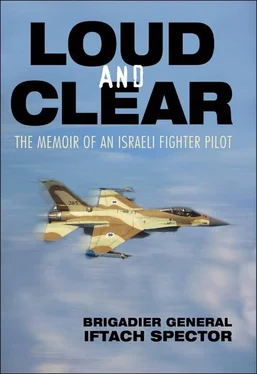“YOU, THE PILOTS OF RAMAT-DAVID,” Ivry resumed with a reality check, “know only what you saw from your cockpits. But reality is multifaceted.”
Ivry, the air force commander at that time, described to us the big picture in which our mission had played its part. He laid out for us an array of situations, pressures, considerations, and even emotions that ordinary people rarely know about and that we, on the front lines, could only imagine. If we thought that Opera, our attack on the Iraqi nuclear reactor, was the main item on the agenda of the leaders, we were wrong. It was not the highest in importance. There were other issues, no less critical.
“At the same time Opera was being mounted, the peace process with Egypt was under way,” Ivry told us, “and there was a danger that this crucial development might be brought to a standstill because of the operation. At the same time, there was something else: the IDF was evacuating the Sinai Peninsula. And at the same time, the fighting in Lebanon kept heating up. After you F-16s shot down the two Syrian helicopters in Lebanon”—this was the first aerial victory achieved by our new F-16s, and Duby Yoffe permitted himself a slight smile—“the Syrians introduced SAMs into Lebanon.” The entire world was occupied with Lebanon. We all were sure that the next clash would take place there.
AND TRULY THERE WERE many aspects in my command of Ramat-David in that fateful time that reminded me of the establishment of the Orange Tails. Ramat-David was farther away from Tel Aviv and isolated in the North, and the air force at large was occupied in other, more important things than the building of its new combat spine. And so it happened that the absorption of the F-16 into the force was given to us in the North almost exclusively, as in the days of the Orange Tails in the South. David Ivry, the all-knowing, was informed of every detail, but still I felt that sometimes this worked like a private business. The whole project was handed to me as an add-on to the command of Ramat-David. I even received the formal title of “project manager,” which confirmed that I had two hats to wear on my one head. This was an unusual management quirk that gave me considerable freedom.
I admit that I liked this exceptional arrangement; the assignment was totally mine, with all responsibility and authority. Rami left me good plans, which I could alter if necessary. All the budgets allocated to the project were at my disposal, and as an added gift I received a civilian comptroller to watch my documents and check my decisions and expenditures, lest I was stealing anything. Throughout these two years, my staff officers and I squeezed out of Ramat-David everything that fine base could give us, and stood the new backbone of the air force on two firm legs. My men and I streamlined and saved, stretched every dollar, and at the end—after the project goals were fully achieved—we were so proud to return the few millions that were left over.
Of course, the comptroller looked at this with a jaundiced eye, and dragged me to Tel Aviv explain that improbability to the Ministry of Defense chiefs. I didn’t mind; it was really fun to answer that yes, I sent my F-16s into battle before the designated date and even though we hadn’t spent all the allocated money, and they brought back good results. The chief laughed, and the comptroller collected his papers and vanished.
It’s not wholly disadvantageous to be an orphan.
“THE DECISION TO ATTACK the Iraqi reactor,” continued Ivry, “was taken only when it became clear that a quantity of nuclear fuel had left France on its way to Iraq. These seventy-five kilograms of nuclear material, once inside the reactor, would make it ‘hot.’ After that, the implications of an attack would be far more serious. The attack would spread nuclear contamination over a wide area. This compelled the government to decide quickly, before the material reached the reactor.”
Ivry was very well prepared. Every now and then he pulled out of his file a handwritten note and showed it to us silently, as proof. This is how secret objects began to be shown.
“Menachem Begin, the prime minister and minister of defense, required full consensus in his cabinet regarding this attack, so there were delays. Meanwhile the Iran-Iraq War went on, so every time the Iranians attacked near Baghdad, more SAM batteries were added around the Tammuz plant. More antiaircraft was deployed there, defensive walls were built around the site, and barrage balloons were anchored in the air above it. Finally, a division of mobile SAM-6s was deployed there, too. The degree of difficulty of the attack went up and up, and together with it the difficulty of deciding whether to do it or not. On January 1981, the last minister who until then had opposed the operation—Deputy Prime Minister Yigael Yadin—consented.”
When he finally agreed, the attack on the reactor was approved, and Opera was ready to go.
“After the attack, some people criticized Prime Minister Begin for arranging the attack with the elections in mind,” Ivey reminded us. “I don’t agree. Had the attack failed, it wouldn’t have helped him get reelected. In my opinion, Begin felt a genuine responsibility to the nation. He feared the next government might be too late to catch the window, before the reactor became hot. And the decision was hard. The intelligence organs opposed the attack; they argued that the Iraqis would only build another reactor within three to five years. Some thought the American reaction would be harsh. We had to prepare for a possible Iraqi military reaction as well.
“Menachem Begin,” said Ivry, “took full responsibility on himself.”
IF BEGIN TOOK ON NATIONAL responsibility, it was David Ivry who had to take on operational responsibility. Our F-16 aircraft were new in the air, with no combat record. They hadn’t even concluded their ordnance testing. The flight profiles of F-16s with two one-ton bombs—the only bombs we had that could penetrate the structure of the reactor—were not verified yet. Anyway, we began training with these bombs hanging on our wings.
One day Ami Rabin, the base’s maintenance officer, entered my office, closed the door behind him, and said: “Iftach, I don’t know what you plan to do with these Mark 84 bombs you keep training with, but if you ever intend to jettison external fuel tanks while those bombs are hanging near them, you better think twice; this configuration has not been tested yet. This can lead to serious trouble.”
We definitely intended to jettison our external tanks on the way to the target after emptying them—this was mandatory to get to Baghdad—and the bombs would be still on the wings. So what? I didn’t understand what was bothering Ami. In Phantoms and Mirages this was standard operating procedure. But Ami was an experienced aeronautical engineer, with a background in munitions, and he taught me that jettisoning empty tanks in unfit conditions might end with the tank hitting the fuselage of the aircraft and even lead to its breakup in the air. Such things had happened before. A warning light flashed in my mind and I shuddered—just imagine our eight-ship formation in a snafu like that on its way to Baghdad.
The air force didn’t have an instrumented F-16 for this kind of testing, so we had to do it “by the seat of our pants.” Within a few days the squadrons themselves conducted an experiment in a rather amateurish way. They found a set of flight conditions in which it was safe to jettison the tanks. This was one example of the uncertainties that came with the new aircraft, and luckily it was exposed in time. It was just luck that we had Ami Rabin with us—he definitely wasn’t the usual maintenance officer. Still, we didn’t know what else we don’t know. We were vulnerable to error.
Читать дальше












